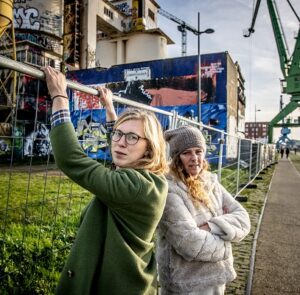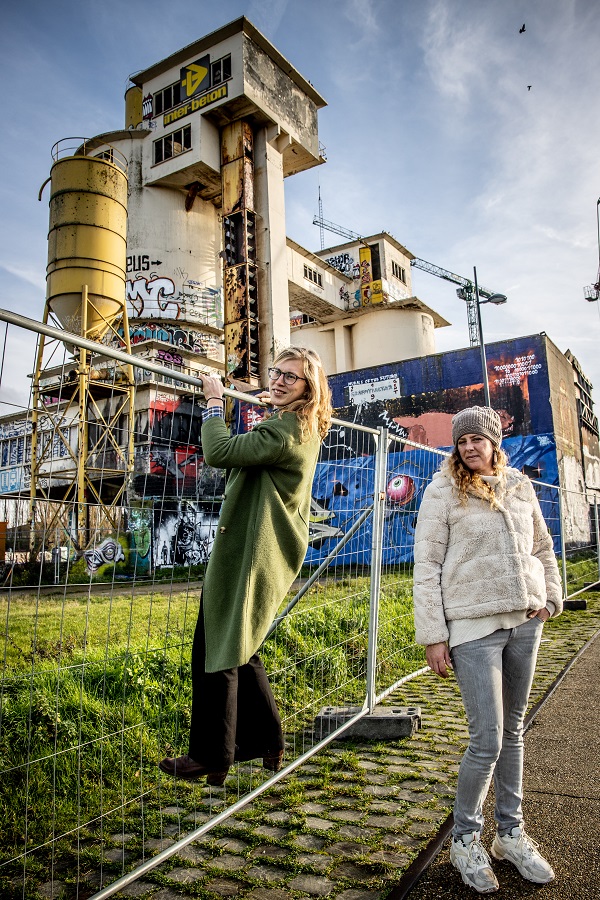Stakeholder Methodiekfabriek as a partner of Roof Food
Creating a collective vegetable garden is one thing; letting local residents manage it successfully is another. For that last aspect, Roof Food collaborates with Eefje Cottenier of Methodiekfabriek in Kortrijk. As a result, they are creating a communal vegetable garden together in ‘De Nieuwe Dokken’, a future residential area in Ghent.
In the Ghent port area, between Dampoort and Muide, Belgium’s first circular residential district is taking shape, namely ‘De Nieuwe Dokken’. In various phases, 400 dwellings (in the form of houses and apartments), offices, a local store, a school and a sports hall will be built. In the courtyard of a building complex, ‘Het Noordveld’ will become a central vegetable garden of 500 square metres, and is to be created by Roof Food.
Participation project
Sabien Windels, the founder of Roof Food: “Actually, the local residents are the people who will create the vegetable garden. The intention is that they will eventually be able to maintain and manage the vegetable garden themselves. That is why it is important to involve them from the start. After all, what is the point of us determining the shape and function of a vegetable garden if the neighbourhood has no interest in it? Eefje Cottenier will help to guide the process, which will involve steps such as determining the form and functionality of the vegetable garden, giving the residents ownership and designing a management model for the garden.
 Methodiekfabriek
Methodiekfabriek
Eefje Cottenier is the founder of both De Stuyverij and the Methodiekfabriek. She created ‘Stuyfplekken’ with De Stuyverij, where people inspire each other and work together on personal and social issues. From these and other experiences, Methodiekfabriek grew.
Eefje Cottenier: “Methodiekfabriek develops new cooperation models that encourage organisations, governments and their target groups to co-create in order to achieve a better society. Our process guidance can lead to sustainable, self-reinforcing and self-managing communities or, other things such as easily implementable designs for both public and community spaces.”
Ownership
Eefje: “In De Nieuwe Dokken, we want to inspire the creation of a central vegetable garden that will also serve as a meeting place for the entire neighbourhood. That is why it is important that the input comes from the local residents themselves and is not imposed from above. Only by actively involving people and giving them ownership can a project like this succeed. In the first phase, we hope to get to know the local residents better. In 2021, we will create a miniature vegetable garden so that it immediately becomes clear how much enthusiasm there is for the vegetable garden. We will be able to see who wants to take on which role, who has which talents, what the neighbourhood has in mind for the garden, and so on. Maybe the local residents will be interested in gardening, without having much spare time for it. This will have an impact on the types of plants in the final vegetable garden.”
 Brainstorm evening
Brainstorm evening
Sabien: “In early 2021, we will organise a brainstorm evening for future residents, houseboat dwellers, Ghent’s ground maintenance service and all other interested parties. The intention is to explore the various possibilities together. We will encourage those present to dream big. This is the only way to formulate new solutions. If you stay too close to reality, you will just be fishing in the same pond. We are open to hearing ideas other than the classic allotments.”
Wild ideas
Eefje: “The ideas can really go in any direction. Maybe the residents will want to create a tomato plantation and use the harvest to make passata for the pizzas they plan on baking together once a month. Anything is possible! What’s also important is that the roles are not fixed. I can imagine a career woman not having much time to work in the vegetable garden, yet once she has kids, she might like to come and visit, which is perfectly fine! It’s up to the residents to determine the direction of the vegetable garden, and then it’s up to us to work out the management model. In the following phase, we will bring the dreams (or parts of them) to reality through workgroups.”
This story was created with the support of Circular Flanders, the Flemish policy-making organisation for a circular economy.


Leave a reply